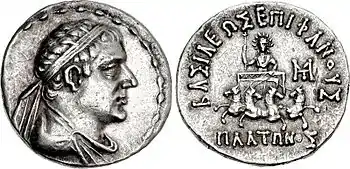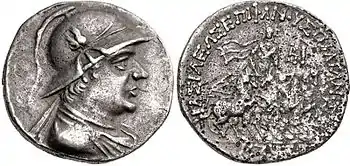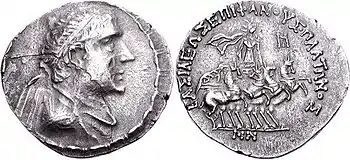
Obv: Diademed bust.
Rev: Sun divinity Helios, riding a four-horse chariot. Greek legend: ΒΑΣΙΛΕΩΣ ΕΠΙΦΑΝΟΥΣ ΠΛΑΤΩΝΟΣ (BASILEOS EPIPHANOYS PLATONOS) "Of King Diodotos Platonos, Manifestation of God on earth". Coin marked MZ, which possibly is a dating which equals year 47 Yavana era = 138 BCE

Obv: Diademed bust.
Rev: Sun divinity Helios, riding a chariot with four horses. Greek legend: ΒΑΣΙΛΕΩΣ ΕΠΙΦΑΝΟΥΣ ΠΛΑΤΩΝΟΣ (BASILEOS EPIPHANOYS PLATONOS) "Of King Platonos, Manifestation of God on earth". Coin marked MT, which possibly is a dating which equals year 49 Yavana era = 136 BCE

Obv: Diademed bust of Platon.
Rev: Sun divinity Helios, riding a four-horse chariot. Greek legend: ΒΑΣΙΛΕΩΣ ΕΠΙΦΑΝΟΥΣ ΠΛΑΤΩΝΟΣ (BASILEOS EPIPHANOYS PLATONOS) "Of the King, Manifestation of God on earth". Coin marked MN, which possibly is a dating which equals year 48 Yavana era = 137 BCE
Diodotus III Plato (Greek: Πλάτων; Platon "broad-shouldered") was a Greco-Bactrian king, also known simply by the regnal name Diodotus III, who for a short time ruled in southern Bactria during the mid 2nd century BCE. The style of Plato's coins suggests that he was a relative most likely a son of Eucratides the Great, whose rise to power is dated to around 170–165 BCE.
Some of Plato's coins have inscriptions which may possibly be interpreted as dates using the Indo-Greek era which started around 186 BCE. In that case Plato ruled around 140 BCE. This matches the dating given by numismatician Bopearachchi, who places Plato between 145–140 BCE, since his coins are not found in the ruins of Ai Khanoum, a Bactrian city which was destroyed during the reign of Eucratides.
See also
References
- "The Shape of Ancient Thought. Comparative studies in Greek and Indian Philosophies" by Thomas McEvilley (Allworth Press and the School of Visual Arts, 2002) ISBN 1-58115-203-5
- "Buddhism in Central Asia" by B. N. Puri (Motilal Banarsidass Pub, January 1, 2000) ISBN 81-208-0372-8
| Preceded by: Eucratides I? |
Greco-Bactrian Ruler (Bactria or its tributaries) |
Succeeded by: Eucratides II? |